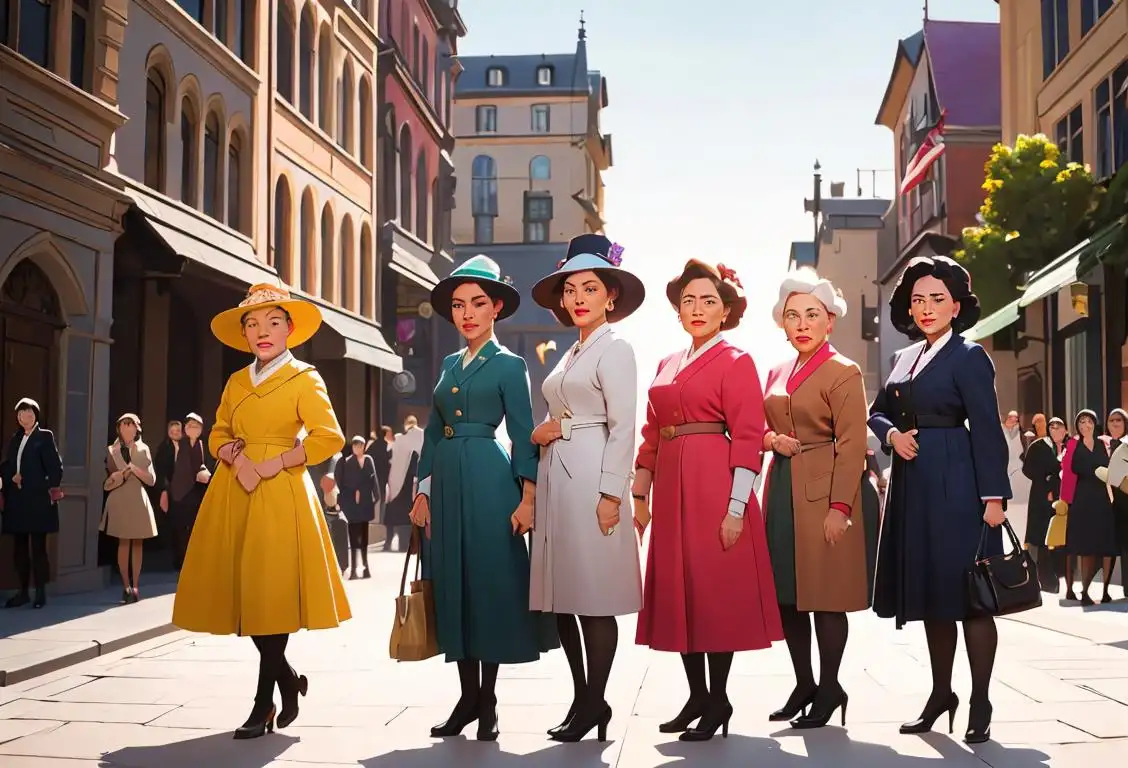National Womens Equality Day

Hey there! Are you ready to celebrate National Women's Equality Day? This is the perfect occasion to recognize and appreciate the amazing women who have fought for equal rights throughout history. Let's dive into the fascinating internet history and facts behind this important day!
When is Womens Equality Day?
It's national womens equality day on the 26th August.
The Origin of National Women's Equality Day
On August 26th, we commemorate National Women's Equality Day, a day dedicated to honoring the adoption of the 19th Amendment to the United States Constitution. This amendment, ratified in 1920, granted women the right to vote, a monumental achievement in the fight for gender equality.
Women's Equality Day was first celebrated in 1971, following a proclamation by the U.S. Congress. It serves as a reminder of the progress made in women's rights, as well as the work that remains. It's a day to reflect on the courageous women who fought tirelessly for suffrage and paved the way for future generations.
History behind the term 'Womens Equality'
1848
Seneca Falls Convention
In 1848, the first women's rights convention in the United States, known as the Seneca Falls Convention, took place in Seneca Falls, New York. This historic event marked a significant step towards women's equality. Organized by Elizabeth Cady Stanton and Lucretia Mott, the convention aimed to address gender inequalities and advocate for women's suffrage. The attendees, both women and men, discussed and adopted the Declaration of Sentiments, which called for women's social, civil, and religious rights.
1848
The Seneca Falls Convention
The Seneca Falls Convention took place in Seneca Falls, New York in 1848. It was organized by women activists such as Elizabeth Cady Stanton and Lucretia Mott. The convention marked the beginning of the women's suffrage movement in the United States. During the convention, the participants discussed the social, civil, and religious rights of women, including the right to vote.
1869-1870
Formation of National Women's Suffrage Associations
During the years 1869 and 1870, two major national women's suffrage associations were formed. The first was the National Woman Suffrage Association (NWSA), established by Elizabeth Cady Stanton and Susan B. Anthony, which focused on advocating for a federal amendment granting women the right to vote. The second was the American Woman Suffrage Association (AWSA), led by Lucy Stone and Henry Blackwell, which aimed to achieve suffrage through state-by-state reforms. These associations played a vital role in the fight for women's equality by organizing campaigns, lobbying for legislation, and raising public awareness.
1869
Formation of the National Woman Suffrage Association (NWSA)
In 1869, Susan B. Anthony and Elizabeth Cady Stanton founded the National Woman Suffrage Association (NWSA). The organization aimed to secure voting rights for women through a constitutional amendment. The NWSA played a significant role in advocating for women's equality, lobbying for changes in state laws and raising awareness about women's suffrage.
1920
Ratification of the 19th Amendment
In 1920, the 19th Amendment to the United States Constitution was ratified, granting women the right to vote. This monumental achievement, often referred to as women's suffrage victory, marked a major milestone in the pursuit of women's equality. Led by suffragettes such as Alice Paul, Elizabeth Cady Stanton, and Susan B. Anthony, decades of activism and advocacy finally culminated in this incredible achievement. The 19th Amendment ensured that gender would no longer be a barrier to political participation, empowering women to have a voice in shaping their country's future.
1920
Ratification of the 19th Amendment
August 18, 1920, marked a monumental moment in women's equality with the ratification of the 19th Amendment to the United States Constitution. This amendment granted women the right to vote, ensuring that gender could no longer be used as a barrier to participating in the democratic process. It was a major achievement for the women's suffrage movement after decades of activism and perseverance.
1963
Publication of Betty Friedan's 'The Feminine Mystique'
In 1963, Betty Friedan, a prominent feminist and activist, published her influential book 'The Feminine Mystique.' This groundbreaking work challenged the traditional roles assigned to women in American society and ignited the second wave of feminism. Friedan's book was instrumental in raising awareness about gender inequality and inspiring women to demand equal rights and opportunities.
1963
The Equal Pay Act
In 1963, the United States enacted the Equal Pay Act, a federal law aimed at abolishing wage disparities based on gender. This landmark legislation aimed to bridge the pay gap between men and women by requiring equal pay for equal work in jobs requiring similar skill, effort, and responsibility. The Equal Pay Act was a significant step forward in advancing women's equality in the workplace and combating gender-based discrimination. However, it's important to note that pay inequity still persists, and further efforts have been made to address this ongoing issue.
1972
Title IX of the Education Amendments
In 1972, Title IX of the Education Amendments was passed in the United States. Title IX prohibits sex-based discrimination in educational settings, including colleges, universities, and K-12 schools. This legislation had a profound impact on women's equality in education, ensuring equal opportunities for both sexes in terms of admissions, financial aid, athletics, and other educational programs or activities. Title IX has played a crucial role in fostering gender equity in academia, empowering women in their pursuit of education and professional opportunities.
1972
Passage of Title IX
In 1972, Title IX of the Education Amendments was passed in the United States. This federal law aimed to eliminate gender-based discrimination in educational institutions receiving federal funding. Title IX played a significant role in promoting women's equality by mandating equal access to educational opportunities, including sports and academic programs. It opened up doors for women to pursue scholarships, sports participation, and educational advancement.
1995
Fourth World Conference on Women
The Fourth World Conference on Women, held in Beijing in 1995, was a significant event for focusing global attention on women's equality. The conference brought together government representatives, activists, and advocates from around the world to discuss issues relating to gender equality and women's rights. One of the notable outcomes of the conference was the adoption of the Beijing Declaration and Platform for Action, which outlined a comprehensive blueprint for advancing women's rights and empowerment. This conference was a critical turning point in shaping the global conversation on gender equality and inspiring further action.
1995
The Fourth World Conference on Women
In 1995, the United Nations held the Fourth World Conference on Women in Beijing, China. The conference brought together activists, policymakers, and representatives from various nations to address global issues related to women's equality and empowerment. The event resulted in the adoption of the Beijing Declaration and Platform for Action, outlining a comprehensive agenda for advancing women's rights internationally.
2017
The #MeToo Movement
In 2017, the #MeToo movement gained significant momentum as a social media campaign aimed at raising awareness about the prevalence of sexual harassment and assault. Started by activist Tarana Burke and popularized by actress Alyssa Milano, this movement encouraged survivors to share their experiences and highlighted the need for systemic change and gender equality. The #MeToo movement garnered worldwide attention and sparked important conversations about women's rights and safety.
Did you know?
Did you know that National Women's Equality Day was officially designated by Congress in honor of suffragists like Susan B. Anthony and Elizabeth Cady Stanton? It's a day to celebrate how far we've come and to keep pushing for gender equality!Tagged
awareness history equalityFirst identified
26th August 2015Most mentioned on
26th August 2015Total mentions
18Other days
Black People Day
Womens Equality Day
Bourbon Day
Vodka Day
No Bra Day
Teacher Appreciation Day
Memorial Day
Former Prisoner Of War Recognition Day
Liberation Day
Doctors Day








